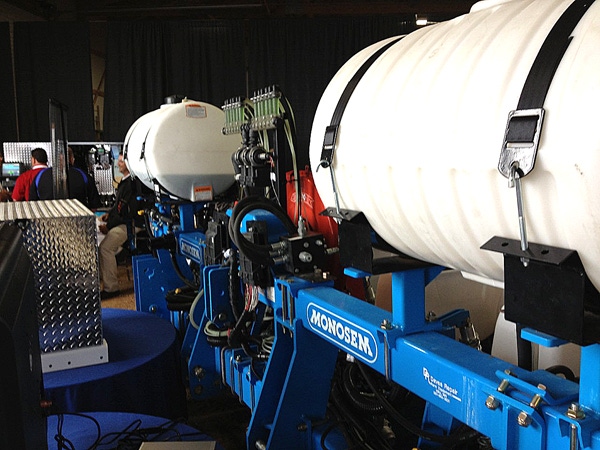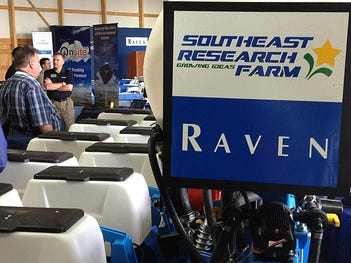June 13, 2013

Last week Raven gave media and dealers the very first look at a planter capable of switching seed hybrids on-the-go to match soil conditions. Raven says it is the first planter that can do this.
The multi-hybrid planter control system is built as an enhancement to Raven’s OmniRow planter control system that allows for variable rate seeding.
Raven worked with SDSU to set up the system on a Monosem twin-row planter. Researchers wanted the system to use in field trials that looked at the yield advantage of switching hybrids in the row on the go based on ground conditions.
Raven says the new planter is two planters in one. It has one toolbar but multiple seed bins and planter controllers. The row units on the Monosem twin-row planter are designed to plant seed in paired rows that are spaced closely together. The row units are staggered to provide the working room needed to plant two rows closely together. With this modified system, the staggered row units are used to plant two different hybrids in one conjoining row. In this case, the front row holds one type of hybrid and the back row holds a different hybrid.
Minimal physical changes were made to the planter itself. What’s different is how the planter is used. The front six rows plant one type of hybrid. The back six rows plant a different type. So, essentially, one planter is working as two planters. Both rows function independently to plant a different hybrid, and, at a different rate.
What Raven brought is the software and components that make it capable of planting two different hybrids in one row. The software lets you switch from hybrid a to hybrid b automatically via a prescription map or manually through the user interface in the cab. Since it is part of the OmniRow planter control system, seeding rates within each row can be varied, too.
The planter is programmed to switch hybrids when field conditions change to maximize yield potential. For example, in sandy or lighter soils or dryer parts of the field you could use a drought-resistant hybrid that requires less water to survive. Or, in areas infested with pests, you could switch to a hybrid designed to resist certain weeds, insects or diseases. All of those conditions can be programmed into the software using prescription mapping.
The guidance line on the steering system is set up to run between each pair of rows. When it is time to switch hybrids, the tractor veers to the right or to the left to plant the desired hybrid in one straight row. Straight rows make the crop easier to harvest. It takes only a few feet for the set up to transition to the next hybrid. 
Each row unit is equipped with a hydraulic motor, which controls which hybrid is released. Sensors on the row unit monitor shaft speed and seed delivery.
Two black boxes on the planter are the brawn of the system. They drive the motors on the row units that control product application. These boxes or modules are the same ones used to control the standard OmniRow system. What’s different are the output cables that run underneath each module. New cables have been added to allow for the new multi-hybrid capability.
The software runs on Raven’s Envizio pro computer. All data and commands reside there. When it is time to harvest the crop, all the operator has to do is move the display from the tractor to the combine cab. All data transfers with display.
The new OmniRow Multi-Hybrid system will be available for the 2014 planting season. It can be installed on twin-row or interplant planter toolbars with minimal changes. Raven recommends working with certified dealer for installation. Contact Raven for a list of names.
The new Viper 4 field computer, also just launched, will eventually be able to run the software once a new module is added to the platform.
For more information, visit ravenprecision.com or call 1-800/243-5435.
PLUS: New tablet-size field computer and variable corn hybrid controller from Raven
About the Author(s)
You May Also Like




